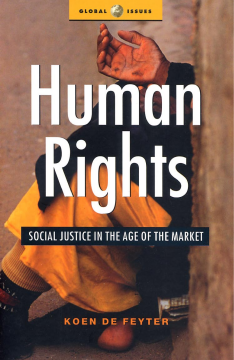
Additional Information
Book Details
Abstract
Koen De Feyter, who has chaired Amnesty International's Working Group on economic, social and cultural rights, shows the many ways in which rampant market economics in today's world leads to violations of human rights. He questions how far the present-day international human rights system really provides effective protection against the adverse effects of globalization. This accessible and thought-provoking book shows both human rights activists and participants in the anti-globalization movement that there is a large, but hitherto untapped, overlap in their agendas, and real potential for a strategic alliance between them in joint campaigns around issues they share.
Koen de Feyter presents the human rights movement with a challenge: to confront today's reality of economic globalization. Our focus of attention should no longer be solely the individual state, but the international community in its various forms and business actors as they increasingly influence human rights performance throughout the world. If human rights is to continue to set the agenda of acceptable action it must confront this changed reality. De Feyter's book sets out an agenda for human rights activism in the Twenty First Century.'
Irene Khan, Former Secretary General, Amnesty International, International Secretariat
'Koen De Feyter analyses the global processes of impoverishment and makes a compelling case for human rights. He passionately argues how a human rights framework provides the best hope for the most vulnerable to achieve human dignity in the age of globalisation. His book treats human rights as a living instrument. We will most definitely be using elements from this book in our work with communities.'
Aye Aye Win, Dignity International
'This robust and realistic narrative of the ways of making, and unmaking, of human rights in an era of globalization should be a constant companion for all those who wish to take the future of human rights seriously.'
Upendra Baxi, Professor of Law, University of Warwick
'This book provides a stimulating analysis of issues and actors that determine the status and enjoyment of human rights in the present day world marked by globalization and the dominant role of the market economy. The author argues quite convincingly that the exclusiveness of the market needs to be countered by the inclusiveness of human rights. Basing himself on a wealth of sources and materials he identifies a series of obstacles that impede the realization of human rights but he also opens up perspectives and avenues of hope for the vulnerable and the marginalized who bear the brunt of deprivation and discrimination. In his thought-provoking study De Feyter develops a broad and comprehensive concept of human rights that is at the heart of the striving for social justice as a common standard of achievement for all.'
Theo van Boven, former director of human rights of the United Nations and special rapporteur on torture
'De Feyter questions how far the international human rights system - focussing as it does on legal conventions and enforcement by state machinery - really provides effective protection against the adverse effects of globalization. The book reveals the potential for a strategic alliance between human rights activists and participants in the anti-globalization and development movements.'
New Sector
Koen de Feyter is a lawyer who has taught and researched in academic settings on human rights and development issues for twenty years. He is currently Senior Lecturer in International Law at the Institute of Development Policy and Management at the University of Antwerp and the Centre for Human Rights at the University of Maastricht.
Table of Contents
| Section Title | Page | Action | Price |
|---|---|---|---|
| Cover | Cover | ||
| Contents | vii | ||
| Boxes and figure | ix | ||
| Acknowledgements | xi | ||
| 1 | Introduction | 1 | ||
| 2 | Essentials | 7 | ||
| Dimensions of globalization | 7 | ||
| States, markets etc. | 11 | ||
| Increasing the relevance of human rights | 19 | ||
| The market-friendly approach to human rights | 28 | ||
| 3 | Obstacles | 31 | ||
| Lack of compliance | 32 | ||
| Selective use and interpretation | 42 | ||
| Tied by treaty | 47 | ||
| Limited by law | 60 | ||
| Notes | 64 | ||
| 4 | After 9/11 | 66 | ||
| The direct impact on human rights of the 11 September attacks and their aftermath | 67 | ||
| Human rights and democracy as justification for the war against Iraq | 73 | ||
| Postponing global social justice? | 82 | ||
| Notes | 89 | ||
| 5 | Geneva | 90 | ||
| The contribution of the UN human rights system | 91 | ||
| Three initiatives of interest | 110 | ||
| Does Geneva matter? | 121 | ||
| Notes | 131 | ||
| 6 | Avenues of hope | 135 | ||
| Peoples’ tribunals | 136 | ||
| Introducing the Social and Economic Rights Action Centre, Nigeria | 143 | ||
| Lagos slum dwellers, Doba residents and the World Bank Inspection Panel | 147 | ||
| Ogoni and Awas Tingni | 155 | ||
| Wiwa v. Shell | 166 | ||
| Notes | 171 | ||
| 7 | The added value of human rights | 174 | ||
| Intellectual property and pharmaceuticals | 177 | ||
| Microcredit | 188 | ||
| Privatization and GATS | 196 | ||
| Agrarian reform | 209 | ||
| Notes | 216 | ||
| 8 | Conclusion | 218 | ||
| References | 224 | ||
| Index | 232 |
